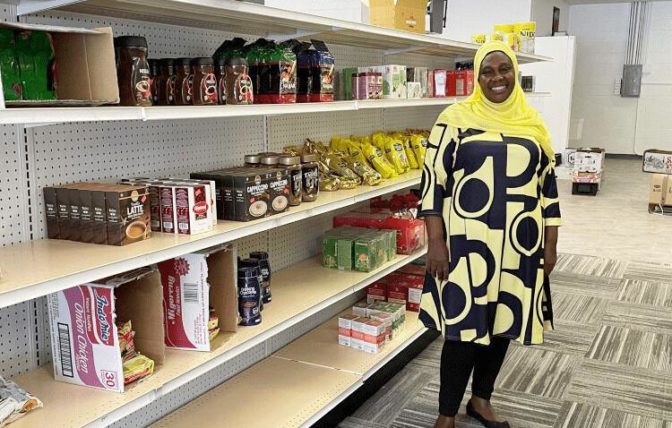
 "
"

 "
"

Nestled within the bustling heart of Pullman, sandwiched between a laundromat and an appliance shop, lies the sole halal store on the Palouse region.
“Greetings, my friend!” Shamsa Njagi warmly calls out as a steady stream of customers enters, often selecting items one by one. Popular choices include ginger paste, Sona Masoori Rice, and paneer.
Up until June, PNW Halal Meats LLC had remained tucked away on the northeast side of Pullman, near the Washington State University campus. The shop occupied a cramped space with limited parking, easily overlooked unless actively sought.
However, its recent relocation to Grand Avenue, one of the city’s most vibrant thoroughfares, has brought heightened visibility, ample parking, expansion opportunities, and a surge of community interest. “We’re witnessing an influx of visitors,” notes Njagi, who immigrated to the U.S from Kenya in 2013. “People not only come to make purchases; they’re curious to explore, which is a remarkable bonus.”
Njagi reveals that numerous newcomers are pleasantly surprised to discover the presence of an international store in Pullman, and even more astounded to learn of its decade-long existence.
Originally working part-time, Njagi and her husband, Ali Ali, took over the store when the previous owner, Mohammed R. Islam, offered them the opportunity—just before the onset of the COVID-19 pandemic.
Both Njagi and Ali now manage the store full-time, while also working at Schweitzer Engineering Laboratories.
Taking the reins during the pandemic’s peak wasn’t easy, admits Njagi. The departure of students turned Pullman into a ghost town, and the store’s sales suffered. “It was a challenging period,” she recalls.
When school is in session, Pullman nearly doubles its population, surging from around 32,000 to 60,000, with approximately 2,000 international students. However, as of 2020, the Association of Religion Data Archives reported fewer than 100 Muslims residing in the county, excluding students.
In the face of student departures, Njagi and Ali turned to local farmers for support. “We’ve always sourced from them,” Njagi explains. “We value patronizing the local community. It’s a mutual empowerment.”
Farmers began supplying lamb and goat to the halal store, allowing Njagi to settle payments once the meat sold. Presently, the store no longer operates on an “I-owe-you” basis with local farmers but relies on them to transport livestock to the USDA meat processor on the WSU campus for halal slaughter, a role Ali undertakes.
Reflecting on the halal slaughtering process, Njagi likens it to familial traditions, passed down through generations. “It’s ancestral knowledge,” she remarks. The process adheres to specific guidelines: an animal permissible for consumption is slaughtered using a sharp knife to swiftly sever the windpipe, carotid artery, and jugular vein, accompanied by a brief blessing called the tasmiyah, translating to “In the name of God, God is greatest.”
R. Brian Siebeking, an assistant professor of religious studies at Gonzaga University, elaborates on the two essential facets of halal meat preparation. He explains that the meat must originate from a permissible animal and be slaughtered according to specific guidelines to ensure minimal suffering. This procedure results in high-quality meat.
Michelle Reynolds, a goat farmer on the outskirts of Moscow, began supplying goats to PNW Halal Meats LLC last year. Praising the collaboration, she emphasizes the learning experience surrounding the halal process and Islam.
With a significant international workforce at Pullman Regional Hospital, where Reynolds is employed full-time, she observes the halal store addressing a distinct demand. She notes that international co-workers appreciate having access to products native to their home countries that are scarcely available at regular grocery stores.
Among these customers is Irebami Olaniran, who hails from Nigeria and came to Pullman to study computer science at WSU. She attests that the store serves as a valuable resource, offering goat meat, basmati rice, and familiar vegetables. Olaniran is even planning to establish Her Haven Beauty within the store, transitioning her online business into a physical shop selling hair products and other items for Black customers. Her aspiration is to create a space for minority communities to gather, socialize, and build connections.
Njagi resonates with this sentiment, asserting the importance of fostering community bonds, particularly in a small town like Pullman. She and Ali travel for hours to Seattle or Portland to procure international goods requested by customers. They are also contemplating introducing a Hispanic selection to their store.
“In Islam, when you face the ultimate judgment, the first query from God won’t be about your treatment of immediate family, but about your interaction with your neighbors,” Njagi reflects. “I’ll always greet my neighbors and those close to me. Even if they don’t respond, I’ll greet them again tomorrow.”